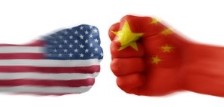|
China Ambassador Warns Of "Dire Consequences" If No Deal Reached, Hints At "All Out" War
by Tyler Durden via stella - Zero Hedge Tuesday, Nov 27 2018, 10:52pm
international /
prose /
post
Earlier today, Trump's chief economic advisor Larry Kudlow poured cold water on expectations for an imminent resolution of the US-China trade war when he said that negotiations in the run up to this week's G-20 talks "haven't yielded any progress", and unless something changes, the "administration will move ahead with the next phase of tariffs."

"Things have been moving very slowly between the two countries," Kudlow said, adding that it was up to Xi to come up with new ideas to break the deadlock. And, echoing a report from the US Trade Representative published earlier this month, Kudlow said there hasn't been much of a change in China's approach. "We can’t find much change in their approach," Kudlow told reporters. "President Xi may have a lot more to say in the bilateral [with Mr Trump], I hope he does by the way, I think we all hope he does...but at the moment, we don‘t see it."
Just a few hours later, a report by Reuters confirmed that Kudlow won't be "seeing it" for a long time, because according to China's ambassador to the US, Cui Tiankai, China is going to this week’s G-20 summit hoping for a deal to ease a damaging trade war with the United States, even as he warned of "dire consequences" if U.S. hardliners - read the trade hawks led by Peter Navarro - try to separate the world’s two largest economies.
Asked whether he though hardliners in the White House were seeking to separate the closely linked U.S. and Chinese economies, Cui said he did not think it was possible or helpful to do so, but warned that "I don’t know if people really realize the possible consequences - the impact, the negative impact - if there is such a decoupling."
He followed up the surprisingly strong statement with an even more shocking comment, in which Tiankai went so far as to tacitly hint that the "lessons of history" suggest that if there is no deal, what comes next could be another great depression... and conventional war.
"The lessons of history are still there. In the last century, we had two world wars, And in between them, the Great Depression. I don’t think anybody should really try to have a repetition of history. These things should never happen again, so people have to act in a responsible way."
Still, the Chinese ambassador toned it down a bit in his next commenting: when asked whether he thought the current tensions, which have seen the two sides impose hundreds of billions of dollars of tit-for-tat tariffs on each other, could degenerate into all-out conflict, Cui called the outcome "unimaginable" and that the two countries should do everything to prevent it.
Note: he did not rule "all-out conflict" out.
Trying to de-escalate the verbal fireworks, Cui then said that China did not want to have a trade war - implying the current state of affairs is all Trump's fault - and sought a negotiated solution to the current impasse stemming from President Trump’s demands for far-reaching Chinese concessions to correct a massive trade imbalance.
And yet, one appears impossible as neither side is willing to compromise or be the first to concede to the demands of the adversary. In fact, as the Chinese ambassador said, Trump's negotiating position in which Xi Jinping is expected to agree with all US terms, "cannot be accepted."
“But the key to this solution is a balanced approach to concerns of both sides,” Cui said. “We cannot accept that one side would put forward a number of demands and the other side just has to satisfy all these things.”
What is confusing to the Chinese diplomat, is Trump's stubborn inability to compromise. Tiankai said the two leaders had “a very good working relationship and personal friendship” formed in three previous face-to-face meetings, including two formal summits, and this had been shown by a long phone conversation in early November.
So three briefly meetings and a phone call, and this is supposed to make the best of friends...
Alas, that's not how the US sees it, with White House insiders saying there remain substantial differences within the Trump administration over how far to push China.
As is well-known by now, this division groups on one side anti-China hardliner and trade adviser Peter Navarro, U.S. Trade Representative Robert Lighthizer and those who favor a complete reevaluation of the relationship. While on the other side are the "globalists" led by White House chief economist Larry Kudlow and Treasury Secretary Steven Mnuchin, concerned about the harm deepening friction could do to the U.S. economy and markets.
Yet even the so-called pragmatic globalists are getting cold feet: Kudlow said on Tuesday that Trump is open to a trade deal with China but is prepared to hike tariffs on Chinese imports if there is no breakthrough on longstanding trade irritants during a planned dinner on Saturday in Buenos Aires with Xi. Worse, he said that talks with China have not yielded any progress yet.
Meanwhile, the G-20 summit begins in three days, and with no deal anywhere on the horizon, soon the only chart that matters may be the following - and most important chart of all - forecasting that China will surpass the US in total military spending in just around 20 years...
Copyright applies.
https://www.zerohedge.com/news/2018-11-27/china-ambassador-warns-dire-consequences-if-no-deal-hints-all-out-war
<< back to stories
|